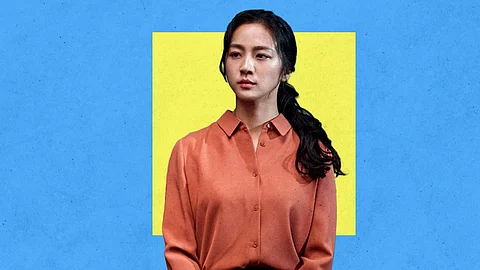
- Reviews
- Power List 2024
- Cannes 2024
- In-Depth Stories
- Web Stories
- News
- FC Lists
- Interviews
- Features
- FC SpecialsFC Specials

Director: Park Chan-wook
Writers: Park Chan-wook, Jeong Seo-kyeong
Cast: Tang Wei, Park Hae-il
A romantic thriller that blurs the line between the procedural nature of being surveilled and the seductive allure of being seen, Park Chan-wook's Decision To Leave might be more muted than his previous films, but the melancholic despair it accumulates by the end couldn't be more distinctly his. The frisson that develops between its lead characters, a detective and his prime suspect, slots perfectly into a filmography rife with examinations of illicit relationships — a priest and his childhood friend’s wife (Thirst), an oblivious father and daughter (Oldboy), a wealthy lady and the pickpocket masquerading as her handmaiden (The Handmaiden). Love in Park Chan-wook’s world oscillates between a corrosive force and an act of redemption and it’s this precise slipperiness that allows the characters in Decision To Leave to approach a murder investigation with all the intensity of a courtship ritual.
What worries Seo-Rae (Tang Wei) isn’t that detective Hae-jun (Park Hae-il) might find evidence linking her to her husband’s death, but that with the case closed, she might cease to occupy his thoughts. Meanwhile Hae-jun, fixated on his suspect, isn’t exactly immune to her ability to pull him out of his own head. The two might start off positioned on opposite sides of the interrogation room, but the framing hints at what’s to come, nudging their reflections closer together. The camerawork grants them a way to occupy and infiltrate each other’s thoughts and spaces with an ease that suggests they’ve always belonged there. There’s a communication barrier between the two — he’s Korean, she’s Chinese and the measured tones of a translation app can’t always convey the intensity of her feelings — but it’s rendered irrelevant by how they seem to be speaking a second, secret language just between the two of them. That’s what makes it so thrilling when one of them finally gets to the point. “Do you stop liking someone you like when they get married?” Seo-Rae asks. Decision To Leave might be chaste by Park Chan-wook standards, but every act is charged with an undercurrent of attraction. A scene of Seo-Rae using Hae-jun’s chapstick speaks to the director’s ability to mine eroticism simply from the intimacy of this gesture.
Thus proceeds a romance between a man who only feels alive around death and a woman who may or may not have killed so she can be free to live. Then again, Decision To Leave is rife with paradoxes and playful with its contrasts. A detective who uses eye drops and whose profession depends on him spotting connections that others have missed lives in a place that’s perpetually foggy, and commits to willful blindness over his suspect’s alleged crimes. Much of the film is about either searching for what’s overlooked or concealing that which you don’t want others to see, a theme reinforced by mirror images and shots viewed through the barriers of glass panes, computer monitors or binoculars.
Over time, the blending of genres between procedural and romance only serves to highlight how similar they are. Hae-jun might be investigating Seo-rae but isn’t wanting to find out everything you can about another person also a hallmark of being attracted to them? His search for the truth positions him on the cliff’s edge between desire and fear — aren’t both embodied by the same stomach-churning sensation? Park Chan-wook evokes the mood and atmosphere of an erotic thriller but also subverts it. Hae-jun might seem like a cop whose morals have been swayed by his affections, but the wall of unsolved cases keeping him up at night conveys his dedication to the job. And Seo-rae’s femme fatale qualities are balanced out by her kindess to the elderly, her loneliness as she falls asleep to the hum of her television every night.
A large part of the film’s second half is predicated on the sinking feeling of knowing, rather than the tentative act of discovering, which just makes the tension all the more delicious. However, the central idea of an ill-fated romance, a tale as old as time, is blunted by an almost-excessive use of modern technology. The narrative detours dilute some of the urgency but the core of yearning stays intact. It gradually seems inevitable that the investigation, the very thing that brought Hae-jun and Seo-rae together, will be what splits them apart. When the moment comes, it’s less explosive than some of Park Chan-wook’s earlier endings but carries the same sense of devastation. For a director who has long made a career of scrutinising even the basest impulses of the human heart, he finally grapples with the consequences of leaving matters unresolved.